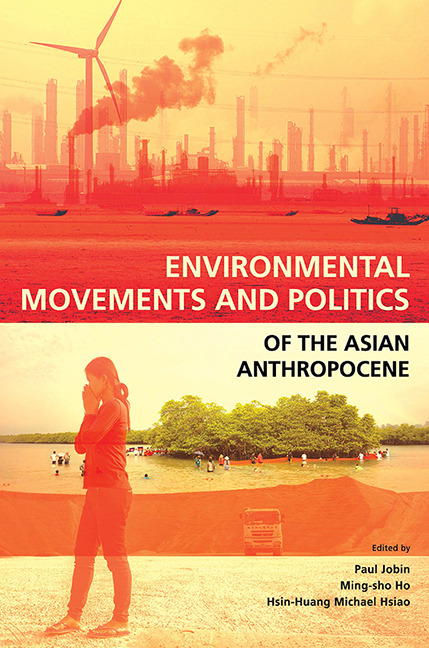Book contents
- Frontmatter
- Contents
- List of Tables, Maps and Figures
- Acknowledgements
- About the Contributors
- 1 Environmental Movements and Politics of the Asian Anthropocene: An Introduction
- 2 Environmental Movements in Taiwan’s Anthropocene: A Civic Eco-Nationalism
- 3 Environmental Movements in Post-handover Hong Kong: Between Managerialism and Radicalism
- 4 The Post-politics of Environmental Engagement in Singapore
- 5 Environmental Movements in the Philippines: Contestation for Justice in the Anthropocene
- 6 Environmental NGOs in “Post-New Order” Indonesia: Saving the Forests Through Democracy
- 7 Environmental Activism in Malaysia: Struggling for Justice from Indigenous Lands to Parliamentary Seats
- 8 State, NGOs, and Villagers: How the Thai Environmental Movement Fell Silent
- 9 Environmental Movements in Vietnam under One-Party Rule
- 10 The Cambodian Neopatrimonial State, Chinese Investments, and Anti-dam Movements
- 11 Conclusion: Environmental Movements and Political Regimes, or Why Democracy Still Matters in the Anthropocene
- Index
4 - The Post-politics of Environmental Engagement in Singapore
Published online by Cambridge University Press: 08 October 2021
- Frontmatter
- Contents
- List of Tables, Maps and Figures
- Acknowledgements
- About the Contributors
- 1 Environmental Movements and Politics of the Asian Anthropocene: An Introduction
- 2 Environmental Movements in Taiwan’s Anthropocene: A Civic Eco-Nationalism
- 3 Environmental Movements in Post-handover Hong Kong: Between Managerialism and Radicalism
- 4 The Post-politics of Environmental Engagement in Singapore
- 5 Environmental Movements in the Philippines: Contestation for Justice in the Anthropocene
- 6 Environmental NGOs in “Post-New Order” Indonesia: Saving the Forests Through Democracy
- 7 Environmental Activism in Malaysia: Struggling for Justice from Indigenous Lands to Parliamentary Seats
- 8 State, NGOs, and Villagers: How the Thai Environmental Movement Fell Silent
- 9 Environmental Movements in Vietnam under One-Party Rule
- 10 The Cambodian Neopatrimonial State, Chinese Investments, and Anti-dam Movements
- 11 Conclusion: Environmental Movements and Political Regimes, or Why Democracy Still Matters in the Anthropocene
- Index
Summary
Twenty years ago, sociologist Daniel Goh commented that Singapore is a strange place for environmentalism (Goh 2000). The reasons for this are two-fold. First, ruled by a single, dominant political party since its independence in 1965, the room for civil society in general has been circumscribed in the best of times, and suppressed in the worst of times. Second, as a small island-state, which reached near complete urbanization as early as the 1980s, Singapore is seen as a place where environmentalism is dissonant with reality. This dissonance becomes more acute as far as nature conservation—an enduring environmental issue—is concerned. Put another way, nature conservation is seen as increasingly irrelevant given the hyper-development of the city-state because there is little space left to conserve in urbanized Singapore. Suffice to say, the perennially weakened state of the environmental movement explains in part why, when it comes to the tug-of-war between conservation and development, the conservationists have more often than not ceded ground to the state. In addition, as this chapter will illustrate, the developmentalist posturing of the Singapore state makes it ideologically challenging for the environmental movement to defend nature conservation. Yet, the latter is but one of the many concerns of the environmental movement.
Indeed, mirroring global trends, the local environmental movement, especially in recent years, has incorporated a plethora of interests beyond nature conservation. How have issues such as animal rights and sustainable living (broadly defined), relatively new forms of environmental concerns here, play out within the environmental politics of Singapore, as compared to the concerns of more “traditional” environmental groups? Further to that, how have the general ebb and flow of the Singaporean political climate affected the development of the environmental movement? These questions, the focus of this chapter, are related in a symbiotic manner. To put it simply, commentators have argued that the introduction of newer, non-traditional environmental concerns spearheaded by younger environmental organizations nudge open the political space in Singapore (Kong 1991), and the latter once opened—even if gingerly—can encourage the further emergence and consolidation of environmental groups.
- Type
- Chapter
- Information
- Environmental Movements and Politics of the Asian Anthropocene , pp. 109 - 138Publisher: ISEAS–Yusof Ishak InstitutePrint publication year: 2021



